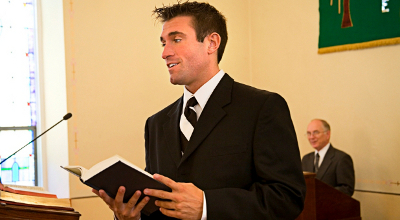Article Index

Elton was a new pastor of a small church up the highway from here. To call him excited is an understatement.
Early in the process, Elton announced to the deacons they would hold an overnight retreat and talk about how things should be done. So far, so good, I suppose.
At the retreat, this new pastor informed his leaders that he would be calling the shots and making all important decisions and their job was to support him.
Elton was fired the next week.
The problem—well, one of them—was that the church Elton came from was run in just that way. The longtime pastor ruled as a benevolent dictator. Those who did not like it were encouraged to find another place to worship. And since the church had grown to be the largest in the area, it appeared that this methodology had heaven’s blessing.
Let’s talk about trust. The new church did not trust Pastor Elton for the simple reason that they did not know him. When he tried to rule with a heavy hand, they rebelled and he was out of work.
Want to hear something confusing?
In college baseball, the coach is called “Coach.” But in Major League Baseball, the coach is called the manager. In high school football, the manager is a kid who takes care of the equipment and runs errands for the coach.
All of which is to make the point, just because members call you the pastor, you’re not necessarily in charge.
The word means one thing to some and something else to others.
The word pastor is akin to our word pasture and means “shepherd,” one who cares for the Lord’s flock.
The new pastor who arrives at a church and instantly expects everyone to follow him will learn all too quickly that they’re not quite ready to do that just yet.
The people must trust the preacher before they will follow him. The question is how to gain that trust:
1. Trust comes with experience, not with the job, the office or the title.
2. Trust comes with personal contact, not with mass ministry.
3. Trust comes with time.
4. Do not insist that people trust you. You must earn their confidence. They will give you their trust when they decide it’s safe, you are dependable, and they are ready.
5. Do nothing abruptly (without proper preparation for your members and in particular your leaders) that is a departure from the norm.
6. Show yourself trustworthy in the routine ministry—sermons, administration, leadership of the staff, leadership of the program and then the extras: weddings, funerals, crisis counseling, etc.
7. Start small. Let them see that you are committed to them and can be trusted to lead them in safe ways to secure places.
8. Do not overpromise or exaggerate. Tell the truth. If you say you’re going to do something, do it. If you promise to look up a Scripture and get an explanation back to someone, do it.
9. Do not hesitate to apologize when you fail to keep a promise.
10. Celebrate those who do well. Call the attention of the church to staffers and members who have served well, have anniversaries or have received some well-earned recognition. Once people see that you are secure and do not mind praising others who serve well, they will trust you more.
11. Now, do not make the mistake of waiting too long to redeem your credits. Once the congregation sees it can trust you, lead out.
12. Make sure you are staying with Christlike and biblical principles of leadership: graciousness, vision, humility, submission and courage.
13. At no time—no matter how great the trust level—should a pastor play the “Authority Card.” You know, “Do this because I say so; I’m the God-appointed leader.” If you have to do that, you’ve lost before you left the starting gate.
Eyes always on the Lord, heart always for God’s people, feet firmly planted on the solid rock of His Word, and hands at work serving and blessing. Be a team player, celebrate victories, and teach your people to pray.
It’s a surefire combination for blessing the Lord and honoring His church.
Dr. Joe McKeever writes from the vantage point of more than 60 years as a disciple of Jesus, more than 50 years preaching His gospel and more than 40 years of cartooning for every imaginable Christian publication.
For the original article, visit joemckeever.com.
Get Spirit-filled content delivered right to your inbox! Click here to subscribe to our newsletter.
Dr. Mark Rutland's
National Institute of Christian Leadership (NICL)
The NICL is one of the top leadership training programs in the U.S. taught by Dr. Mark Rutland. If you're the type of leader that likes to have total control over every aspect of your ministry and your future success, the NICL is right for you!
FREE NICL MINI-COURSE - Enroll for 3-hours of training from Dr. Rutland's full leadership course. Experience the NICL and decide if this training is right for you and your team.
Do you feel stuck? Do you feel like you’re not growing? Do you need help from an expert in leadership? There is no other leadership training like the NICL. Gain the leadership skills and confidence you need to lead your church, business or ministry. Get ready to accomplish all of your God-given dreams. CLICK HERE for NICL training dates and details.The NICL Online is an option for any leader with time or schedule constraints. It's also for leaders who want to expedite their training to receive advanced standing for Master Level credit hours. Work through Dr. Rutland's full training from the comfort of your home or ministry at your pace. Learn more about NICL Online. Learn more about NICL Online.


